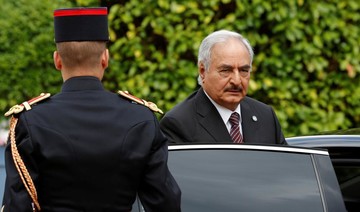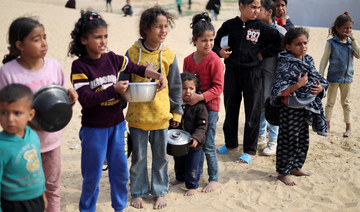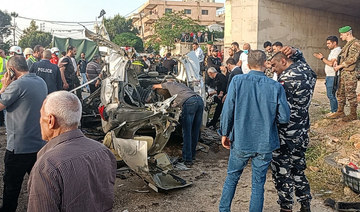BENGHAZI: Libyan commander Khalifa Haftar will transfer control of oil ports recently recaptured by his forces to the administration in eastern Libya he supports, a spokesman for the field marshal said Monday.
Haftar’s announcement came just hours after his Libyan National Army said it had regained “full control” of the country’s oil crescent after driving a rival militia out of the area.
“All the oil installations controlled by (Haftar’s) Libyan National Army are being handed over to the National Oil Corporation dependent on the provisional eastern government and that is headed by Faraj Al-Hassi,” spokesman Ahmad Al-Mesmari said.
Haftar supports an administration based in Libya’s east that opposes the internationally recognized government in Tripoli.
The LNA already announced last Thursday that it had recaptured the Ras Lanuf and Al-Sidra terminals, a week after they were seized by armed groups led by militia leader Ibrahim Jadhran, although military operations in the area were unfinished.
Jadhran’s Petroleum Facilities Guard controlled the two key oil ports for years following the 2011 NATO-backed removal of Muammar Qaddafi — but they were eventually forced out by the LNA in September 2016.
The spokesman Mesmari said oil revenues from the four terminals now under LNA control would be handled by the administration in the east supported by Haftar.
Haftar made the decision after realizing “rival armed groups are financed by oil revenues secured by the LNA,” Mesmari said, referring to Jadhran’s forces.
Up until now, the terminals have been managed by the National Oil Company tied to Libya’s internationally recognized government based in Tripoli.
The NOC is chaired by Mustafa Sanalla, who represented Libya last week at an OPEC meeting in Vienna.
Clashes between Jadhran’s forces and the LNA in the oil crescent pushed the NOC on June 14 to suspend exports from terminals in the area, warning of billions of dollars in losses.
After visiting the Ras Lanuf terminal on Sunday, the NOC said violence had slashed oil production by almost half and cost billions of dollars in losses.
Libya’s economy relies heavily on oil, with production at 1.6 million barrels per day under Qaddafi.
The uprising that led Qaddafi’s demise saw production fall to about 20 percent of that level, before recovering to more than one million barrels per day by the end of 2017.
Haftar hands captured Libyan oil terminals to eastern administration
Haftar hands captured Libyan oil terminals to eastern administration

- Libyan National Army says it had regained “full control” of oil crescent.
- Haftar supports administration in the east that opposes government in Tripoli.
Israel calls ICC prosecutor’s bid for PM arrest warrant a ‘historical disgrace’

The minister added that Israel would establish a special committee to fight the ICC prosecutor’s efforts to secure a warrant
JERUSALEM: Israel on Monday slammed as a “historical disgrace” an application by the prosecutor of the International Criminal Court for an arrest warrant for Prime Minister Benjamin Netanyahu.
The prosecutor, Karim Khan, applied for arrest warrants against Netanyahu and Defense Minister Yoav Gallant as well as top Hamas leaders on suspicion of war crimes and crimes against humanity.
Foreign Minister Israel Katz said that Khan “in the same breath mentions the Prime Minister and the Minister of Defense of the State of Israel alongside the abominable Nazi monsters of Hamas — a historical disgrace that will be remembered forever.”
The prosecutor said he was seeking warrants against Netanyahu and Gallant for crimes including “wilful killing,” “extermination and/or murder” and “starvation.”
Katz denounced the move as a “scandalous decision” that amounted to “a frontal attack... on the victims of October 7” when Hamas launched their attack on Israel, sparking the Gaza war.
The minister added that Israel would establish a special committee to fight the ICC prosecutor’s efforts to secure a warrant, and also embark on a diplomatic push against it.
Katz said he planned to “speak with foreign ministers in leading countries of the world so that they oppose the prosecutor’s decision and announce that, even if orders are issued, they do not intend to enforce them on the leaders of the State of Israel.”
35,562 Palestinians killed in Gaza offensive since Oct. 7 — health ministry

- 106 Palestinians were killed and 176 injured in the past 24 hours
DUBAI: More than 35,562 Palestinians have been killed and 79,652 injured in the Israeli military offensive on Gaza since Oct. 7, the Gaza health ministry said in a statement on Monday.
One hundred and six Palestinians were killed and 176 injured in the past 24 hours, the ministry added.
Source close to Hezbollah says 4 dead in Israeli strikes on Lebanon

- The source close to Hezbollah told AFP that “at least four Hezbollah fighters were killed in Israeli raids on two different sites in southern Lebanon“
- The Israeli military said fighter jets struck “a Hezbollah terrorist cell”
BEIRUT: A source close to Hezbollah said four fighters were killed Monday in south Lebanon, with the Iran-backed group announcing two dead and a retaliatory attack, while Israel claimed strikes.
Hezbollah, a Hamas ally, has traded near daily cross-border fire with Israeli forces since the Palestinian group’s October 7 attack on southern Israel that sparked the war in Gaza.
The source close to Hezbollah told AFP that “at least four Hezbollah fighters were killed in Israeli raids on two different sites in southern Lebanon,” identifying the locations as Naqura on the coast and Mais Al-Jabal, a border village to the east.
The Shiite Muslim movement said two of its fighters, both from Naqura, had been killed, without providing further details.
The Israeli military said fighter jets struck “a Hezbollah terrorist cell” and a launch post in the Mais Al-Jabal area, while Israeli army “artillery fired to remove a threat” in the Naqura area.
Hezbollah said it launched a heavy rocket attack at an Israeli army barracks in the country’s north “in retaliation” for the Naqura strike, while also announcing other attacks on Israeli positions.
Lebanon’s official National News Agency (NNA) reported Israeli strikes on Mais Al-Jabal and Naqura, where it said Israel fired near Hezbollah-affiliated rescue personnel and wounded a civilian.
The fighting has killed at least 423 people in Lebanon, mostly militants but also including 82 civilians, according to an AFP tally.
Israel says 14 soldiers and 11 civilians have been killed on its side of the border.
The violence has raised fears of all-out conflict between Hezbollah and Israel, which went to war in 2006.
War monitor says Israeli strikes kill six pro-Iran fighters in Syria

- A Hezbollah source said that at least one fighter from the group was killed in Israeli strikes in the Qusayr area
Beirut: A war monitor said at least six pro-Iran fighters were killed Monday in Israeli strikes in Syria near the Lebanese border, in an area where Lebanon’s powerful Hezbollah group holds sway.
The Syrian Observatory for Human Rights said “Israeli strikes targeted two positions of pro-Iran groups in the Homs region,” including “a Hezbollah site in the Qusayr area” near the border where “six Iran-backed fighters were killed.”
The Observatory did not specify their nationalities.
A Hezbollah source told AFP that at least one fighter from the group was killed in Israeli strikes in the Qusayr area.
Israel rarely comments on individual strikes in Syria but has repeatedly said it will not allow its arch-enemy Iran to expand its presence there.
On Saturday, the Observatory said an Israeli drone strike near the Lebanese border targeted a vehicle carrying “a Hezbollah commander and his companion,” without reporting casualties.
Hezbollah did not announce any deaths among its ranks on Saturday.
On May 9, Israeli strikes on Syria targeted facilities belonging to Iraq’s Al-Nujaba armed movement, the Observatory and the pro-Iran group said, with Damascus saying an unidentified building was attacked.
The Israeli military has carried out hundreds of strikes in Syria since the outbreak of the civil war in its northern neighbor in 2011, mainly targeting army positions and Iran-backed fighters including from Lebanon’s Hezbollah group.
But the strikes increased after Israel’s war with Hamas in the Gaza Strip began on October 7, when the Iran-backed Palestinian militant group launched an unprecedented attack against Israel.
Syria’s war has killed more than half a million people and displaced millions more since it erupted in 2011 after Damascus cracked down on anti-government protests.
ICC prosecutor seeks arrest warrant for Israeli and Hamas leaders, including Netanyahu

- Karim Khan believes Benjamin Netanyahu, Yoav Gallant and three Hamas leaders are responsible for war crimes and crimes against humanity
THE HAGUE, Netherlands: The chief prosecutor of the International Criminal Court said Monday he is seeking arrest warrants for Israeli and Hamas leaders, including Israeli Prime Minister Benjamin Netanyahu, in connection with their actions during the seven-month war between Israel and Hamas.
Karim Khan said that he believes Netanyahu, his defense minister Yoav Gallant and three Hamas leaders — Yehia Sinwar, Mohammed Deif and Ismail Haniyeh — are responsible for war crimes and crimes against humanity in the Gaza Strip and Israel.
The prosecutor must request the warrants from a pre-trial panel of three judges, who take on average two months to consider the evidence and determine if the proceedings can move forward.
Israel is not a member of the court, and even if the arrest warrants are issued, Netanyahu and Gallant do not face any immediate risk of prosecution. But Khan’s announcement deepens Israel’s isolation as it presses ahead with its war, and the threat of arrest could make it difficult for the Israeli leaders to travel abroad.
Both Sinwar and Deif are believed to be hiding in Gaza as Israel tries to hunt them down. But Haniyeh, the supreme leader of the Islamic militant group, is based in Qatar and frequently travels across the region.
There was no immediate comment from either side.
Israel launched its war in response to an Oct. 7 cross-border attack by Hamas that killed some 1,200 people, mostly civilians, and took 250 others hostage. The Israeli offensive has killed over 35,000 Palestinians, at least half of them women and children, according to the latest estimates by Gaza health officials. The Israeli offensive has also triggered a humanitarian crisis in Gaza, displacing roughly 80 percent of the population and leaving hundreds of thousands of people on the brink of starvation, according to UN officials.
Speaking of the Israeli actions, Khan said in a statement that “the effects of the use of starvation as a method of warfare, together with other attacks and collective punishment against the civilian population of Gaza are acute, visible and widely known. ... They include malnutrition, dehydration, profound suffering and an increasing number of deaths among the Palestinian population, including babies, other children, and women.”
The United Nations and other aid agencies have repeatedly accused Israel of hindering aid deliveries throughout the war. Israel denies this, saying there are no restrictions on aid entering Gaza and accusing the United Nations of failing to distribute aid. The UN says aid workers have repeatedly come under Israeli fire, and also says ongoing fighting and a security vacuum have impeded deliveries.
Of the Hamas actions on Oct. 7, Khan, who visited the region in December, said that he saw for himself “the devastating scenes of these attacks and the profound impact of the unconscionable crimes charged in the applications filed today. Speaking with survivors, I heard how the love within a family, the deepest bonds between a parent and a child, were contorted to inflict unfathomable pain through calculated cruelty and extreme callousness. These acts demand accountability.”
After a brief period of international support for its war, Israel has faced increasing criticism as the war has dragged on and the death toll has climbed.
Israel is also facing a South African case in the International Court of Justice accusing Israel of genocide. Israel denies those charges.



















